The US-Russia race in Syria: towards a military confrontation?
16 Replies

Military operations on the Iraqi-Syrian borders will close all roads to ISIS
Published here: alrai.li/klhg3nh via @AlraiMediaGroup
Key words: USA, US, Russia, Moscow, Washington, Iran, Turkey, Syria, Iraq.
By Elijah J. Magnier – @EjmAlrai
Moscow and Damascus prepare their respective forces – and those of their allies – to initiate aggressive multi-objective battles directed towards the Syrian-Iraqi borders (and towards Deir-ezzour). These take place at the same time as the Iraqi forces initiate a battle not far from the Syrian borders, in the Iraqi western desert, as Prime Minister Haidar al-Abadi has announced.
The new Iraqi battles – supported by the US and coalition forces – aim to secure the border triangle up to the Jordanian borders or Ratba, including the Iraqi-Syrian borders once the cities of Ana and Rawa are liberated. Other battles, without coalition support, are expected to be carried out by the Iraqi forces of “Hashd al-Sha’bi” (Popular Mobilisation Units- PMU), heading towards al-Ba’aj, and closing all routes between Iraq and Syria.
The various battles on both sides of the borders have another objective: to protect the backs of the US forces and their Syrian proxies present at al-Tanaf crossing (on the Syrian side). This also helps to meet the advance of the US Special Operation Forces and the Kurds of the “Syrian Democratic Forces” (SDF) advancing towards al-Qaem and already only dozens of kilometres from their objective.
These advances will put the “Islamic State” group (ISIS) between two fires on both sides of the Syrian and the Iraqi borders: militants will have no other alternative but to fight or die, to surrender or escape into the Anbar and Syrian deserts. Other may seek refuge with al-Qaeda group (under the name of Hay’atTahrir al-Sham) – also facing serious extermination once ISIS is wiped out from the territories it has controlled since 2014.
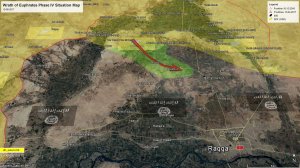
On the other hand, Moscow, Damascus and Tehran, including all their respective allies, have started multi-front battles in the east south, middle and north of Syria to counter the US plans. A large number of allies’ forces were pushed into the front line to prepare for the forthcoming battle against the US and their proxies on the various fronts:
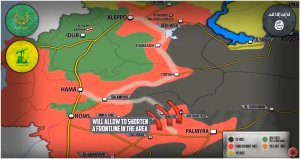
-The Deir-ezzour front: Both Washington and Moscow announced their will to reach the besieged city of Deir-ezzour (each for its own purpose and with its own allied forces), to break ISIS lines surrounding the city. Nevertheless, the US’s chances are slim because the Syrian Army and its allies have defended the north-eastern city for years, preventing it from falling into the hands of ISIS or any other force advancing towards the city. Therefore it is most likely that Moscow will imposes the momentum in the area, otherwise it may not be possible to avoid a military confrontation between the two superpowers. Neither Washington nor Moscow seem ready to be dragged into a larger war over the control of one Syrian city.
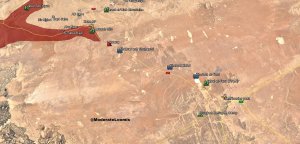
-Towards al-Tanaf crossing: There are already US Special Operation Forces and their Syrian proxies present on the Syrian-Iraqi crossing point. Al-Tanaf is situated in a large open desert, used only as a border point between the two countries. Moscow is also determined to reach it and recover it, with the support of its allied ground forces, putting Washington again in an awkward situation. The US has to coordinate with Russia or it will be forced to pull out from al-Tanaf, even if its Syrian proxies decide to hold and defend their position. Al-Tanaf represents another issue from the logistics point of view: the forces who control it need regular logistics and supply lines, weapons and vital survival support. This will be a challenge for any force willing to occupy it.
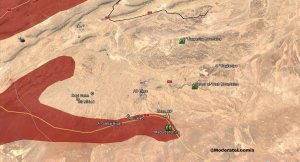
-Al Badiya al-Surya (The Syrian steppe): On this front, the US-Jordanian proxies are advancing from the provinces of Daraa and Suweida southeast Syria in the Syrian semi-desert steppe. The Syrian Army started its air bombing on these forces to prevent them from advancing towards al-Tanaf or to close with the Syrian Army troops in Palmyra (Tadmur). Once more, the US and Russia (along with Damascus and Tehran) are confronting each other on Syrian soil: too many dangerously conflicting areas and interests.
Thus, under the title “defeating ISIS”, the multiple battles and the confrontation of forces present themselves fundamentally as a confrontation between the two superpowers. There are Special Operation Forces of both Russia and the US in Syria where both support their proxies, guide their military operations, call for air support, coordinate with their respective operation rooms and- ultimately- end up facing each other.

The forthcoming battles will be taking place outside the “de-conflict zones” agreed by Moscow, Ankara and Tehran in Astana-Kazakhstan (with US representatives acting as observers). The Syrian steppes, Deir-ezzour, al-Tanaf, al-Qaem and Raqqah were all excluded from the deal. Moscow is giving its priority to the “borders battle” – responding also to the will of the allies that form the “axis of the resistance” –following the visit of the Iraqi PMU Leader, Faleh al-Fay’yad, who informed Damascus and Beirut (Hezbollah) about the Prime Minister Abadi’s plans “suggested” by the Americans.
This is why – according to sources within the Prime Minister’s office – Baghdad started the Tanaf – Qaem – Ba’aj battle, following pressure exerted by the US military command stationed in Iraq. Such a request rings bells among the leadership in Syria, confirming that Washington is preparing for the phase after the war to spread its control into various territories in Syria, including border areas, under the pretext of “defeating ISIS”. This Salafi-Jihadi group is in its final chapter and everybody in Mesopotamia and Bilad al-Sham is racing to take over its territories. ISIS, the once glorious that broke the Sykes-Picot borders and occupied vast territories in 2014 is crumbling on all fronts!
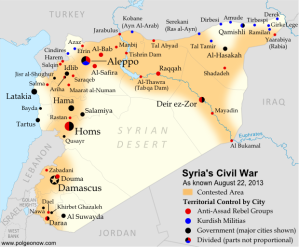
Thus, these military operations with multiple objectives will aim to draw a line between the two superpowers in Syria, hinting in effect that the war is going to end, although al-Qaeda (Hay’at Tahrir al-Sham) can still play a destructive role. This group has been excluded from any deal, even if the city it is mainly occupying has been included in the de-conflict areas (as requested by Turkey and agreed by Damascus, Russia and Tehran). However, al-Qaeda itself rejected the Astana deal and considered any rebel group signing the deal worthy of being killed on the spot.
It is not the first time that both Russia and the US are racing for the control of a single territory (cf. Berlin at the end of the second World War). This race today emphasises that Syria will no doubt face partition. Nevertheless, the presence of occupation forces on its land doesn’t mean these will be spared: Tehran, Damascus and Hezbollah all vow to attack these forces. Would Russia allow this to happen to the US forces or it would just sit back and watch its opponent get hit in Bilad al-Sham?
The “axis of resistance” has other projects and objectives too, starting from dealing with the Israeli forces on the occupied Golan heights to the US forces in the northeast and east of Syria, not forgetting the danger both ISIS and al-Qaeda still represent, even if they are defeated in Syria. Stability in the Middle East is still far from being achieved.



